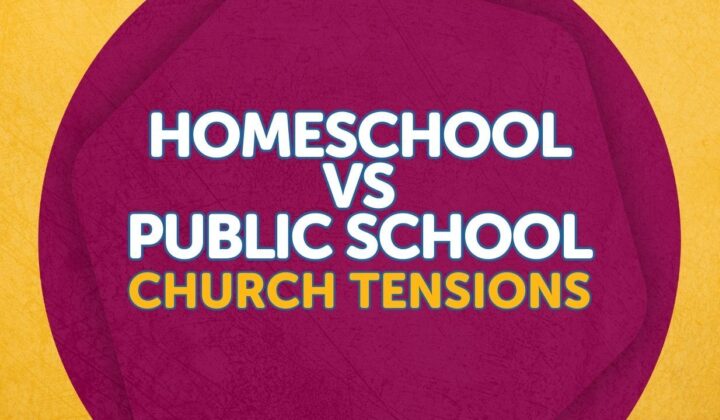Learn more about the journey that led to us equipping kids to carefully evaluate every idea they encounter.
Meet members of our team who have contributed to curriculum development.
Hear from real users of the Foundation Curriculum.
Learn what we believe about God, Jesus, Scripture, and more.
Creating a Peaceful Learning Environment at Home
Hello, friends!
Today’s podcast question is short and sweet:
“How can I cultivate a peaceful learning environment at home?”
At first glance, this might seem like a question just for homeschooling families—but it’s actually relevant for all Christian parents. Whether your children are homeschooled, attend public school, or go to a private Christian school, making your home conducive to learning is essential.
As Christians, we understand that God designed us to learn more about the world He created. In Genesis, we're called to be fruitful, multiply, fill the earth, and subdue it. Part of that calling includes learning about the world and how to steward it well.
We also want our children to become lifelong learners, not just kids who jump through academic hoops. We want them to love learning and grow in the skills they need to seek God through His Word. So no matter your child's educational setting, your home plays a vital role.
Let’s dive into four key strategies to create a peaceful learning environment at home.
1. Provide Plenty of Opportunities for Free Play
This might sound counterintuitive, but unstructured playtime is crucial for child development and learning. Whether your child is homeschooled or attends school, they need time to run, explore, and imagine.
I recently encouraged a homeschooling mom whose kids were rushing through lessons just to get back to playing. She was doing the right thing by making sure the lessons were completed—but it's also wise to value play as essential learning time.
Encourage outside play. Use public parks, create a backyard play space, and give your kids space to explore. As they grow, gradually release more responsibility—let them take risks, solve conflicts, and engage with the world on their own terms. The world can be their classroom!
2. Set Boundaries Around the Learning Space
Whether it’s homeschool work or after-school homework, the environment where learning takes place matters.
Ideally, have a dedicated learning space in your home. If you have an extra room or office, reserve it only for schoolwork. This helps your child’s brain recognize: “I’m in learning mode.”
When I’m working in my own home office, I maintain strict boundaries—I don’t even enter on Sundays to protect my Sabbath rest. That boundary helps me mentally shift in and out of work mode.
If you don’t have a separate room, find ways to signal to your child that this is learning time. For example:
-
Use a special chair only for schoolwork.
-
Give them a pair of “indoor shoes” worn only during homework time.
-
Use a designated “school sweater” just for lessons.
When I taught 4th grade science, I gave students “science glasses” (cheap dollar store reading glasses with lenses removed) to wear during class. It was silly—but effective! It helped them mentally shift into discovery mode.
3. Make the Space Conducive to Focus
Now that you have a designated space or signals, make sure that space promotes concentration and calm.
Minimize distractions:
-
No TVs or phones in the learning space.
-
Keep music off during focused work time.
-
Limit wall clutter and visual noise. Some academic posters are fine—but avoid turning the room into an art gallery.
As a teacher, I kept my classroom minimalist: three bulletin boards and a Bible timeline. Special education teachers often thanked me—it wasn’t overly stimulating for kids with learning difficulties.
Lighting and temperature also matter. Studies show that natural light and a room temperature around 72°F help children stay alert and focused. If ideal conditions aren’t possible, just ensure your child is comfortable:
-
Offer a blanket or sweater in colder temps.
-
Use a fan in the summer if there’s no AC.
-
The goal is to keep their body from focusing on comfort so they can focus on learning.
4. Be Consistent, Yet Wisely Offer Flexibility
Children thrive on predictability. If your expectation is that your child sits during lessons—stick with that. If you’re okay with sitting or standing, be consistent.
But also be flexible. Kids need movement to maintain focus:
-
For every 30 minutes of work, give them a chance to get up and move.
-
Change locations: from the table to the rug, or to a reading corner.
-
Encourage breaks with snacks, water, or outside time.
When I taught long lessons, I intentionally moved students from their desks to the rug and back. That small movement helped their bodies pump more oxygen to the brain, increasing alertness.
Also:
-
Offer water and healthy snacks before work time.
-
Avoid sugar-heavy treats like Oreos right before homework—it affects focus.
-
Schedule breaks into the day, especially for homeschool families.
Finally, use wisdom when flexibility is needed:
-
Is your child recovering from illness?
-
Are they emotionally drained from a tough day?
-
Did they just complete a mentally demanding task?
You know your child best. Maintain structure, but give grace where needed.
Final Thoughts
If you have your own tips for creating a peaceful learning environment at home, leave a comment on YouTube—we’d love to hear what’s working in your family.
And remember, no matter the situation you or your children are in, God is working all things together for your good, conforming you more into the image of His Son.
Thanks for joining me today on the Foundation Worldview Podcast. If you have a question for a future episode, submit it at foundationworldview.com/podcast.
Until next time!
Related Posts and insights

Navigating Homeschool & Public School Tensions in the Church
Feeling tension between homeschool and public school moms at church? Discover biblical wisdom to navigate differences and foster unity in the body of Christ.

Teaching Tip: Summer Challenge: Equip Kids to Master New Skills
Encourage kids to grow this summer! Discover how offering a summer challenge to master new skills fosters responsibility and a biblical view of work.

Homeschool or Public School?
Do you believe Christians should favor homeschooling more than public school? In this video, Elizabeth Urbanowicz take an in-depth look into the debate between public and homeschooling, particularly from a Christian perspective. We explore the pros and cons of each option, as well as discuss what biblical principles should be taken into consideration when making such an important decision.



